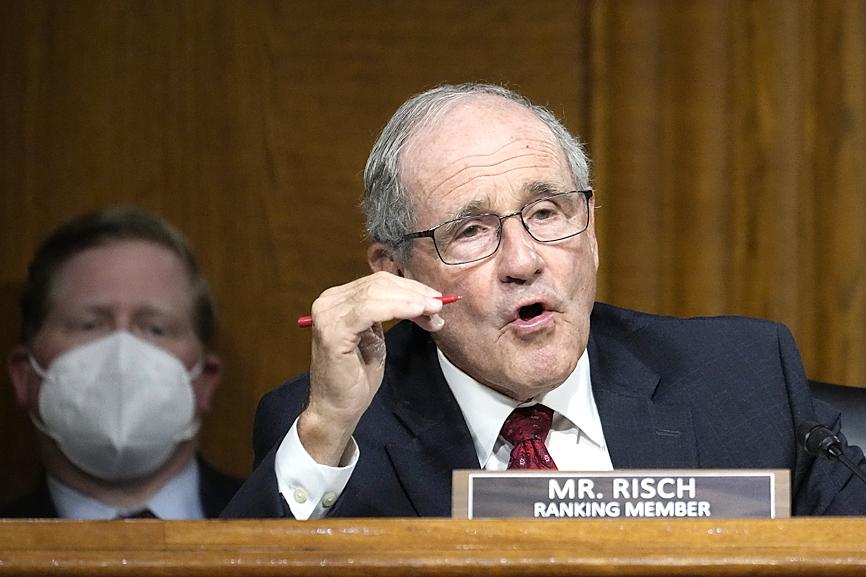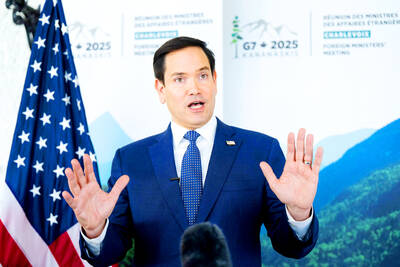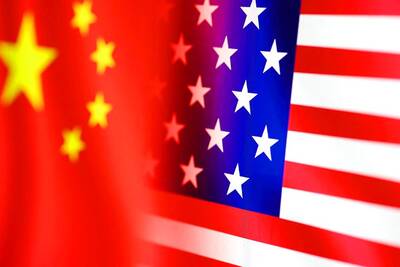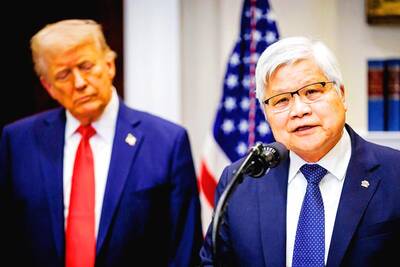US senators on Thursday introduced draft legislation seeking to provide US$2 billion per year and other assistance to bolster’s Taiwan’s defenses as it faces rising pressure from China.
The legislation, reviewed by Reuters, would authorize US$2 billion a year in Foreign Military Financing — US grants and loans that enable countries to purchase weapons and defense equipment produced in the US — through 2032 for Taiwan.
While the bill is sponsored only by Republicans, the minority party in the US Senate, it adds to pressure from the US Congress on US President Joe Biden, a Democrat, for bolder action to strengthen ties with Taiwan.

Photo: Bloomberg
The US is Taiwan’s main military supplier.
The bill’s lead sponsor is US Senator Jim Risch, the top Republican on the Senate Foreign Relations Committee. Cosponsors include US senators Mike Crapo, John Cornyn, Bill Hagerty, Mitt Romney and Marco Rubio.
It was not immediately clear how Democrats view the bill.
The funding would come with conditions, including Taiwan committing to match US spending, and whether Taipei and Washington agree to conduct joint long-range planning for capacity development.
The US has urged Taiwan to pursue defense reforms to focus on capabilities to make its military forces more mobile and harder to attack, as well as to ensure it maintains a strong reserve force.
The draft “Taiwan deterrence act” also would amend the US’ Arms Export Control Act, which governs foreign military sales, to make it easier for US firms to sell arms to Taiwan.
It also would require an annual assessment of Taiwan’s efforts to advance defense strategy toward China.
The bill also seeks to improve military exchanges with Taiwan, and expand professional military education and technical training opportunities in the US for Taiwanese military personnel.
“The defense of Taiwan is critical to retaining the credibility of the United States as a defender of the democratic values and free-market principles embodied by the people and government of Taiwan,” the bill says.
In Taipei, the Ministry of Foreign Affairs issued a statement thanking the senators for introducing the bill, adding that it would continue to follow the progress of the draft bill closely.
The ministry said that “it will maintain close contact with friends in the US Congress to pragmatically and steadily deepen Taiwan-US security cooperation.”
During President Tsai Ing-wen’s (蔡英文) first term in office, which mostly coincided with former US president Donald Trump’s four years in office, Taiwan spent US$16.8 billion to buy US weapons, nearly as much as the US$20 billion it spent during the eight years of former US president Barack Obama’s two terms.
In 2019 and last year, the amount Taiwan spent annually on purchasing US weapons was three times as much as the average spent each year during the Obama years.
It was unclear whether Taiwan initiated a request for funding assistance or whether the senators are hoping this offer would spur Taipei to spend more on defense and buy more US weapons.
Additional reporting by CNA

‘CROWN JEWEL’: Washington ‘can delay and deter’ Chinese President Xi Jinping’s plans for Taiwan, but it is ‘a very delicate situation there,’ the secretary of state said US President Donald Trump is opposed to any change to Taiwan’s “status quo” by force or extortion and would maintain that policy, US Secretary of State Marco Rubio told the Hugh Hewitt Show host on Wednesday. The US’ policy is to maintain Taiwan’s “status quo” and to oppose any changes in the situation by force or extortion, Rubio said. Hewitt asked Rubio about the significance of Trump earlier this month speaking with Taiwan Semiconductor Manufacturing Co (台積電) chairman C.C. Wei (魏哲家) at the White House, a meeting that Hewitt described as a “big deal.” Asked whether the meeting was an indication of the

‘RELATIVELY STRONG LANGUAGE’: An expert said the state department has not softened its language on China and was ‘probably a little more Taiwan supportive’ China’s latest drills near Taiwan on Monday were “brazen and irresponsible threats,” a US Department of State spokesperson said on Tuesday, while reiterating Washington’s decades-long support of Taipei. “China cannot credibly claim to be a ‘force for stability in a turbulent world’ while issuing brazen and irresponsible threats toward Taiwan,” the unnamed spokesperson said in an e-mailed response to media queries. Washington’s enduring commitment to Taiwan will continue as it has for 45 years and the US “will continue to support Taiwan in the face of China’s military, economic, informational and diplomatic pressure campaign,” the e-mail said. “Alongside our international partners, we firmly

KAOHSIUNG CEREMONY: The contract chipmaker is planning to build 5 fabs in the southern city to gradually expand its 2-nanometer chip capacity Taiwan Semiconductor Manufacturing Co (TSMC, 台積電), the world’s biggest contract chipmaker, yesterday confirmed that it plans to hold a ceremony on March 31 to unveil a capacity expansion plan for its most advanced 2-nanometer chips in Kaohsiung, demonstrating its commitment to further investment at home. The ceremony is to be hosted by TSMC cochief operating officer Y.P. Chyn (秦永沛). It did not disclose whether Premier Cho Jung-tai (卓榮泰) and high-ranking government officials would attend the ceremony. More details are to be released next week, it said. The chipmaker’s latest move came after its announcement earlier this month of an additional US$100 billion

Authorities yesterday elaborated on the rules governing Employment Gold Cards after a US cardholder was barred from entering Taiwan for six years after working without a permit during a 2023 visit. American YouTuber LeLe Farley was barred after already being approved for an Employment Gold Card, he said in a video published on his channel on Saturday. Farley, who has more than 420,000 subscribers on his YouTube channel, was approved for his Gold Card last month, but was told at a check-in counter at the Los Angeles International Airport that he could not enter Taiwan. That was because he previously participated in two